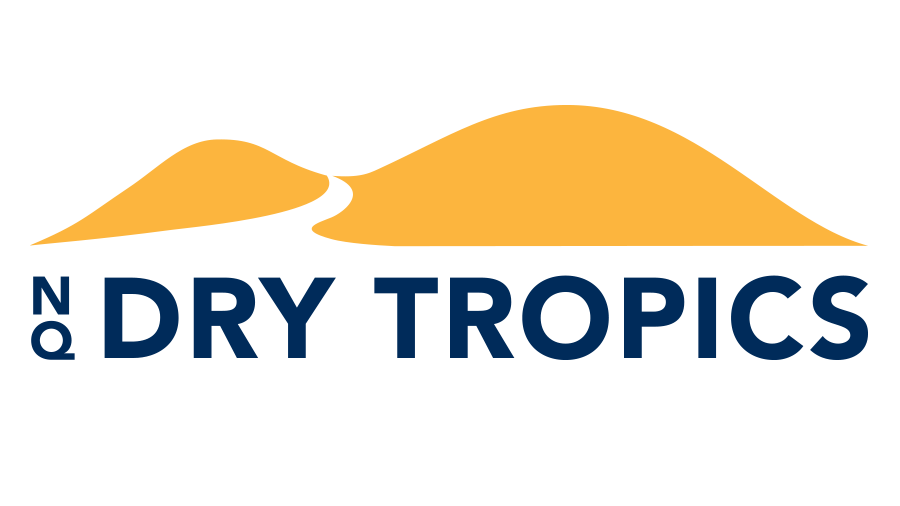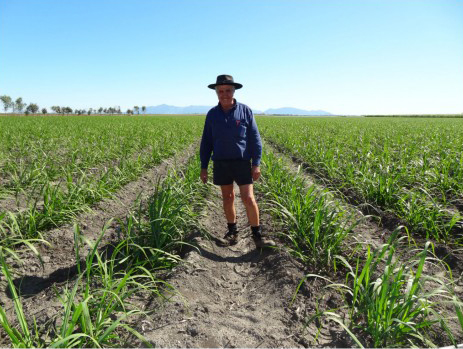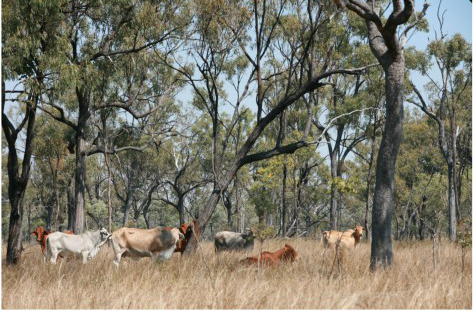Sustainable Agriculture Program
The vision of the Sustainable Agriculture Program is resilient landscapes and productive enterprises, agricultural producers maximising outputs while minimising environmental impacts.
The Sustainable Agriculture Program aims to support and empower producers in the use of best management practices for natural resource management within the agricultural industries of the Burdekin Dry Tropics NRM Region. This is done through:
- planning for the sustainable management of land and water resources;
- managing and delivering programs that help protect, maintain and restore land and water resources; enhancing the capacity of the community to manage for sustainability;
- sharing knowledge;
- promoting learning, continuous improvement and best practice; and
- developing partnerships.
The Sustainable Agriculture Program works across the region providing information, training and assistance to graziers through workshops, training and grants to enhance the capacity of farmers and graziers to manage their land sustainably.
The Sustainable Agriculture team supports the delivery of innovation, training, extension and water quality improvement grants for sugar-related projects in the Burdekin Dry Tropics region. At a broad level, these projects are aimed at supporting and facilitating:
- an improved understanding of the links between management practices and the condition of natural resources, particularly in relation to catchment and reef water quality;
- the adoption of best management practices for water quality management; and
- the management of a financial incentives scheme for growers.
Burdekin Water Quality grants
$500 RCS course subsidy
Sustainable Agriculture current projects
Landholders Driving Change
The Landholders Driving Change project (LDC), funded from 2017-2021 by the Queensland Government through the Queensland Reef Water Quality Plan, continues supported by funding through the Great Barrier Reef’s partnership with the Australian Government’s Reef Trust.
LDC concentrated landscape repair and land management efforts in the Bowen, Broken, Bogie (BBB) catchment because it delivers about 50 per cent of the fine sediment load from the Burdekin Basin.
The ongoing sediment reduction program to improve water quality in the Bowen, Broken, Bogie (BBB) catchment will deliver accelerated grazing support (extension) to encourage improved land management practice and large and small-scale gully remediation. Read more…
Stomping out Sediment in the Burdekin
Funded through Australian Government Reef Trust Phase IV investment to help deliver the Reef 2050 Long Term Sustainability Plan, NQ Dry Tropics is working with up to 10 grazing properties in targeted Burdekin catchments over five years, starting in July 2017 and ending in July 2022. The project is for the long-term protection and conservation of the Great Barrier Reef. Read more..
Regenerative Grazing Tools for Burdekin Soils and Pastures (2019- 2023)
The four-year Regenerative Grazing Tools for Burdekin Soils and Pastures project is increasing the capacity of graziers to adapt their agricultural systems to significant changes in climate. The project is supporting three cluster groups of five grazing enterprises (fifteen enterprises in total) in the Belyando, Suttor and Cape Campaspe sub basins of the Burdekin River catchment. It promotes grazing management practices as a key tool to improving business resilience through improved soil health and pasture condition. The project is delivered by NQ Dry Tropics through funding from the Australian Government’s National Landcare Program. It is a continuation of the Building Dynamic Burdekin Grazing Businesses project, also funded through the National Landcare Program. Read more…
Paddock to Reef
The Paddock to Reef Integrated Monitoring, Modelling and Reporting Program (Paddock to Reef program) is a collaborative program designed to collect and integrate data on agricultural management, catchment indicators and loads, and the health of the Great Barrier Reef. Read more..
Reef Alliance Project (RAP) – Growing a Great Barrier Reef – Cane Innovations
Innovation in on‐farm practice and grower engagement is critical to realising the significant reduction in pollutant loads required by the Reef 2050 Plan. The Reef Alliance Project, Sugar Innovation Program supported Burdekin cane farmers to implement innovative practices which would decrease the impact of agriculture on water, soil and biodiversity assets. These projects resulted in significant production, economic and water quality outcomes as explained here.
Reef Alliance Project (RAP) – Growing a Great Barrier Reef – RAP Burdekin Cane Project - Phase II
This voluntary project assists cane growers to improve management practices and productivity, while also reducing nutrient and pesticide runoff to the Great Barrier Reef lagoon. Delivered by our Sustainable Agriculture team, the project offers cane growers extension, training and Reef water quality incentives to improve efficiency, and help the Reef build resilience against the impacts of climate change and natural disasters. Read more..
Reef Trust Tender – Burdekin Cane Industry
The Reef Trust Tender – Burdekin Cane is an Australian Government initiative to improve the quality of water entering the Great Barrier Reef and to support the sustainability of the sugarcane industry in the Burdekin. The project aims to protect and conserve the Great Barrier Reef by addressing the issue of nitrogen discharge from the Burdekin region. Read more..
GRASS (Grazing Resilience and Sustainable Solutions)
Herding Change Through Grassroots Recovery
Burdekin Major Integrated Project Gully Maintenance and Monitoring
Lower Burdekin Water Quality Program
Sustainable Agriculture completed projects
Reefwise Grazing of Burdekin Rangelands
The Reefwise grazing of Burdekin Rangelands project is delivered to graziers within the high sediment yielding sub-catchments of the Upper and Lower Burdekin rangelands. It is funded by the partnership between the Australian Government’s Reef Trust and the Great Barrier Reef Foundation. Building on the momentum achieved through the Reef Trust 1 Saving Our Soils (Promotion of A-Class grazing) project, Reefwise Grazing of Burdekin Rangelands will support 12 graziers to adopt whole of property management strategies that support improved water quality. Read more..
Reef Alliance Project (RAP) – Growing a Great Barrier Reef – RAP Burdekin Grazing Project - Phase I
NQ Dry Tropics Sustainable Agriculture programme is delivering extension, training and Reef Water Quality Grants as part of the Reef Alliance – Growing a Great Barrier Reef programme funded by the Australian Government Reef Trust through the Queensland Farmers Federation (QFF) and a partnership between AgForce, Cape York NRM, NQ Dry Tropics, Fitzroy Basin Association and Burnett Mary Regional Group. Read more..
PatchKey Rangeland Monitoring
The PatchKey methodology has been developed by CSIRO as a rangeland biophysical monitoring tool. Prior funding has been utilised to adapt existing software to NQ Dry Tropics requirements, purchase equipment, train field staff and initial data collection. Read more..
Reef Alliance Project (RAP) – Growing a Great Barrier Reef – RAP Burdekin Cane Project - Phase I
NQ Dry Tropics Sustainable Agriculture program is delivering extension, training and Reef Water Quality Grants as part of the Reef Alliance – Growing a Great Barrier Reef programme funded by the Australian Government Reef Trust through the Queensland Farmers Federation (QFF) and a partnership between CANEGROWERS, NQ Dry Tropics, Terrain NRM and the Burnett Mary Regional Group. Read more..
Sustainable Soils for the Burdekin (2013-2018)
The project builds on existing relationships with industry, local government, Traditional Owners and Landcare groups to strengthen the understanding of soil health and management within the grazing and grower community in the Burdekin catchment. Read more..
Point Source Sediment Management (2016-2019)
The Point Source Sediment Management in the Burdekin Dry Tropics NRM region – East Burdekin and Bowen-Broken-Bogie projects supported graziers to make changes to management practices to reduce sediment losses and improve the quality of water entering the reef, building on the outcomes of Reef Trust Phase I. Read more..
Project Catalyst (2016-2019)
The primary purpose of Project Catalyst was to reduce the environmental footprint that sugarcane production has on freshwater quality and the Great Barrier Reef by speeding the evolution of cutting edge farming practices in the sugar industry. Project Catalyst was a project supported through the Coca-Cola Foundation (TCCF) and World Wildlife Fund (WWF) since 2009. Project Catalyst covered 3 of the reef catchments including Wet Tropics, Burdekin Tropics (since 2010) and the Mackay/Whitsundays and was delivered by the Regional NRM bodies in these regions.
Building Resilience in the Burdekin Grazing Industry (2013-2018)
The Building Resilience in the Burdekin Grazing Industry project was funded through the Queensland Government Natural Resource Management Investment Program 2013-14 to 2017-2018. The project trialed innovative grazing practices to improve land condition, water resources and environmental assets.
Reef Program (2008-2013)
From 2008-2013 the Australian Government invested over $32 million into grazing/farming communities within the Burdekin Dry Tropics region to assist with practice changes that will reduce sediment, nutrients and pesticides leaving farms and entering the Great Barrier Reef Lagoon.
Gamechanger Project (2013-2016)
The Fast tracking adoption of game changing sugarcane nutrient and pesticide management practices project was a 3 year project (2013-2016) funded through the Australian Government Reef Programme.
Saving Our Soils Project (2015-2018)
Saving Our Soils was a project partnership delivered by the Fitzroy Basin Association (FBA)and NQ Dry Tropics. The three-year project (2015-2018) was funded by the Australian Government’s Reef Trust in collaboration with the Queensland Government and Great Barrier Reef Marine Park Authority.
Gully Prioritisation (2017-2018)
The main outcome of this project was to develop a gully prioritisation methodology to inform future investment in gully remediation works that can be implemented immediately using available information and resources.
Grazing BMP Project (2014-2017)
The Grazing BMP program was developed from the collaborative efforts of the Queensland Department of Agriculture, Fisheries and Forestry (QDAFF), Fitzroy Basin Association (FBA) and AgForce Queensland.
Tackling gully erosion
Video outlines range of gully strategies
When tackling soil erosion on grazing lands, it’s important to treat both the cause and symptoms.
NQ Dry Tropics works closely with landholders on strategies that promote better pasture cover, and help hydrate landscapes by retaining rain on property, slowing it down and spreading it out across paddocks.
This video showcases five different techniques that have been used to remediate eroded gullies, and all of them consider the bigger picture by incorporating improvements in land management.
A big thank you to the graziers who took part in the film – Shane Watts, Sonoma, Keith Atkinson, Camel Creek, Paul Rowe, Riverview, Owen Howard, Hell’s Gate and Chris LeFeuvre, Worona.
These projects were funded through Australian Department of the Environment and Energy Reef Trust.
Factsheets
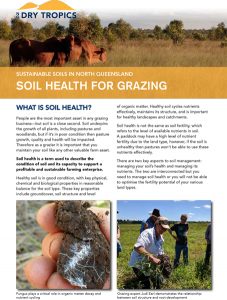 |
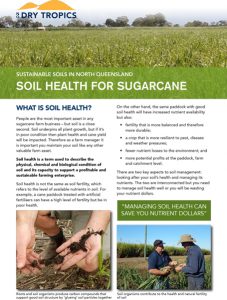 |
Case Study Videos
With much of the region continuing to suffer from drought, an increasing number of graziers are looking for ways to build resilience into their businesses by maintaining good pasture levels and improving land condition. NQ Dry Tropics’ three-year (2013-2016) Building Resilience in the Burdekin Grazing Industry project, funded through the Queensland Government’s Regional NRM Investment Program, has been supporting three grazing families, managing a combined area of 56,000ha, to take part in a long-term trial of the Holistic Management approach to looking after their business and their land.
Barry and Leanne O’Sullivan, who run Glenalpine Station near Bowen, have derived multiple benefits from high-density grazing. They won a 2014 Rural Queensland Premier’s Sustainability Award for their achievements. Check out their story. |
Shane and Amanda Watts own and manage Sonoma Station, a 14,400-hectare property near Collinsville. Hear Shane explain how Holistic management, which advocates resting country for long periods, has led to a huge increase in pasture diversity. |
Watch how Barry and Leanne O’Sullivan successfully rehabilitated a gully on their Glenalpine Property, using ultra high-density cattle impact to thoroughly break down the headcut and the sides, and achieve a layer of manure and urine slurry about an inch thick spread across the gully system. |
Tom and Karen Murphy own and operate Tabletop, their 18,970 ha property near Collinsville, alongside daughter Nikki and partner Harry Howard. Check out their story about how practical, cost effective and innovative approaches to land management have impacted their business. |
